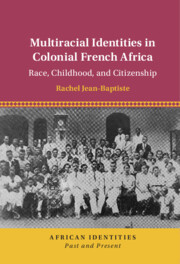Book contents
- Multiracial Identities in Colonial French Africa
- African Identities: Past and Present
- Multiracial Identities in Colonial French Africa
- Copyright page
- Contents
- Figures
- Tables
- Acknowledgments
- Introduction
- 1 Multiracial Identities and the Consolidation and Subversion of Racialized French Colonial Rule in French West Africa and French Equatorial Africa, ca. 1900–1930
- 2 Wards of the State
- 3 “I Am French”
- 4 “Odd Notions of Race”
- 5 Humanizing Maternal and Child Welfare in Dakar, 1949–1956
- 6 Multiracial Internationalism
- Epilogue
- References
- Index
4 - “Odd Notions of Race”
Reconfiguring Rights of/to Citizenship and Children, 1939–ca. 1950
Published online by Cambridge University Press: 25 May 2023
- Multiracial Identities in Colonial French Africa
- African Identities: Past and Present
- Multiracial Identities in Colonial French Africa
- Copyright page
- Contents
- Figures
- Tables
- Acknowledgments
- Introduction
- 1 Multiracial Identities and the Consolidation and Subversion of Racialized French Colonial Rule in French West Africa and French Equatorial Africa, ca. 1900–1930
- 2 Wards of the State
- 3 “I Am French”
- 4 “Odd Notions of Race”
- 5 Humanizing Maternal and Child Welfare in Dakar, 1949–1956
- 6 Multiracial Internationalism
- Epilogue
- References
- Index
Summary
Chapter 4 explores conceptions about race and multiraciality as articulated by and about métis. These ideas were central in defining the meaning and practice of French citizenship and social childhood welfare in French Africa during and after World War II (1939–1950). The main focus is Brazzaville, the capital of Free France in World War II and the center of contestations regarding the “métis question.” The chapter chronicles how what was debated, decided, and rejected here reverberated elsewhere in FEA and FWA. Even as Vichy, Free France, and post-Nazi occupation factions competed about who was the legitimate government, “the métis question” remained critical in the effort to maintain the French Empire in years of precarity. Métis people forwarded various multiracial identities and claims to legal status and quotidian rights. Their demands sparked contestations with and within the post-1946 French government and among French-educated black Africans. There was increasing mobilization by collectives of people of varied ethno-language groups in French Africa, who came together around thier shared identity as black (noire) and hightled the antiblack racism of French colonialism and of métis themselves.
- Type
- Chapter
- Information
- Multiracial Identities in Colonial French AfricaRace, Childhood, and Citizenship, pp. 147 - 194Publisher: Cambridge University PressPrint publication year: 2023

